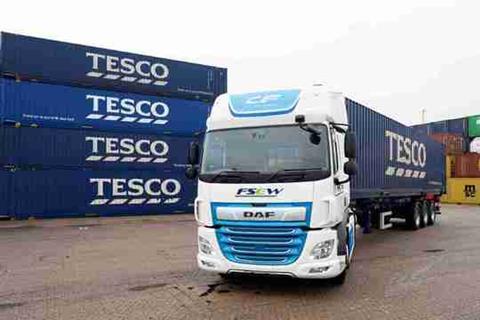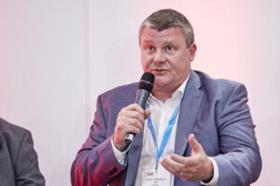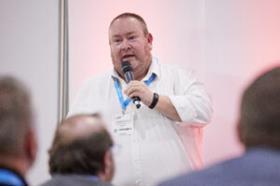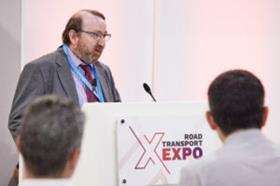
Leading operators have hailed the benefits of investing in alternatively fuelled trucks, saying soaring diesel prices mean now is the right time for others to follow suit.
Speaking during a panel discussion at Road Transport Expo at NAEC Stoneleigh, Geoff Tomlinson, MD of Cardiff-based freight forwarder FSEW, said media reports of the harmful effects of pollution on local school children had shocked him into bringing two new DAF 37-tonne electric trucks onto his fleet as part of the government's £200m zero-emission HGV programme.
The ongoing trial, which involves his biggest customer Tesco as well as other retailers, has quickly altered driver attitudes, with an initital reluctance to use the new vehicles now switched to "queing up to drive them”.
FSEW now aims to have a fully zero-emission fleet by 2025 and will use it to expand its operation into east London and the East Midlands.
“We believe we can make it work and make money. We’re concentrating on getting the intelligence to do gas and electric trucks and make sure we can deliver to customers and carry the heavy loads," said Tomlinson.

“Batteries are going to get better, we’re going to get a 300-mile range, hydrogen fuel cell technology is coming. The price of diesel isn’t going to change for the next 18 months so now’s the time to grab alternative fuel.”
Tomlinson added that his customers are also now beginning to see the financial sense in backing his approach.
“Customers really don’t get the carbonsiation message,” he said. “We’ve been lucky with Tesco that it’s not all about price for them. But 99% of our customer base are now talking about electric trucks because they’re blatantly cheaper because of the diesel fuel surcharge.”
He added that the government should now be engaging with the top transport companies and providing financial backing: “Companies are spending a lot of time on research but we’ve been waiting too long,” he said.
“In theory there are a lot of clever people sitting on the fence for a year or two. Some are waiting for the motorways to be charged or for special re-charging t armac. I can’t see any government paying for that, and even if it happened we wouldn’t get it for five years so let’s crack on.”
Ocado fleet operations manager - truck, Graham Thomas, said battery technology was improving at “an alarming rate of knots”.

“Three years ago, a truck manufacturer told me it would be 2039 before we would see a fully viable electric tractor unit but they’re now saying they’ll have a 500km range by 2024. That’s a heck of a change in three years,” he said.
“Many operators are looking at flexing their business models to make it work,” he added. “But my fear is that hauliers will be asking if we have the infrastructure to make sure they’re ready. The reality is we can be running all bar our 6x2 tractor units on CNG by 2026. I still think our toughest challenge is with the 3.5-tonner. We need more financial support.”
Owain Pearce, transport manager at Oxford Direct Services agreed: “It depends on the sector,” he said. “In the freight industry we could be 100% zero emission by 2030. The biggest stumbling block is cost. It’s an extra £200,000 for a new electric commercial vehicle. We’d be talking about putting an extra £5m on our budget per year to replace our fleet. There’s more than one horse to back and it isn’t one size fits all.”

Pearce called for more government support and urged hauliers to prioritise their decarbonisation planning: “I’ve been saying it since 2018,” he said. “Geoff’s done it and it’s fantastic. The hydrogen fuel cell for the 6x2 tractor unit will help. We just need a couple of real leaders in terms of technologies to give confidence.
“Some government bodies are proactive but it isn’t being listened to by the people who finally make the decisions. We’re fully on board to convert to electric or hydrogen if the costs make it viable but we have to be responsible in our decisions. We’d love to change our whole fleet but we just can’t afford to.”













